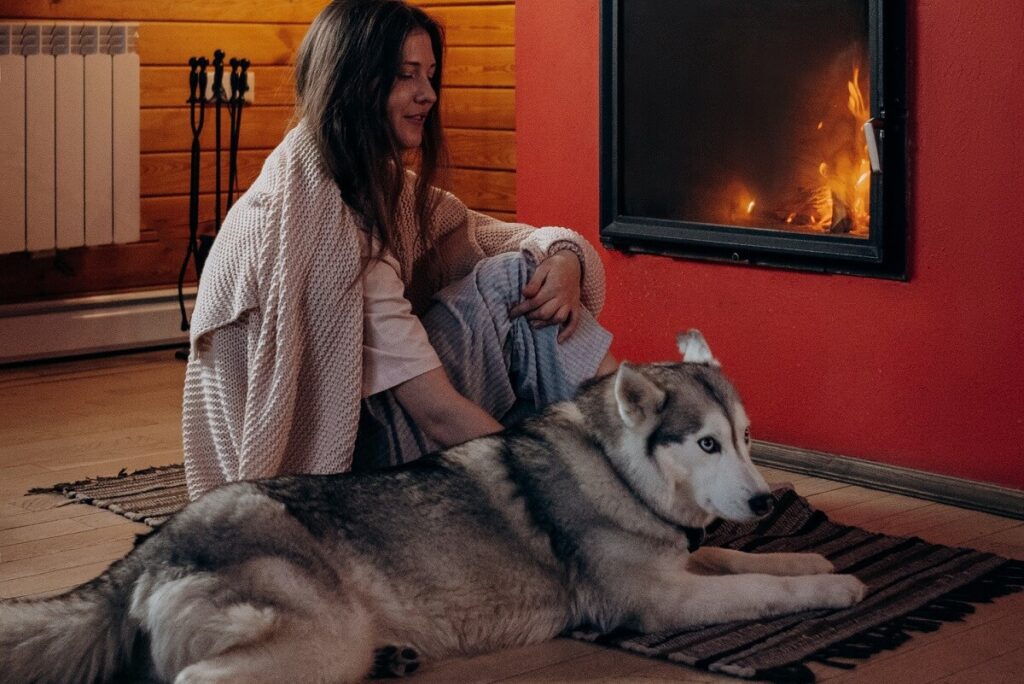Winters bring out the coolest venture both for us and our four-legged fellow. From jumping up and sliding on frozen lakes to eating the snow as it falls, dogs enjoy every bit of this season just like us. Either, they may like playing with the snow or simply cannot stay inside, it is hard to keep them indoors for longer periods.
You may think his long coat or sturdy body is capable of resisting the winter chills. The reality is that dogs are just as susceptible to cold as we are, even more sometimes. As the season changes, pets require a change in their grooming routine as well. You need to take extra care of your furry fellows in cold temperatures. So, to make your adventure next level, follow these 10 tips for caring for your dog this winter.
1. Care for The Paws!
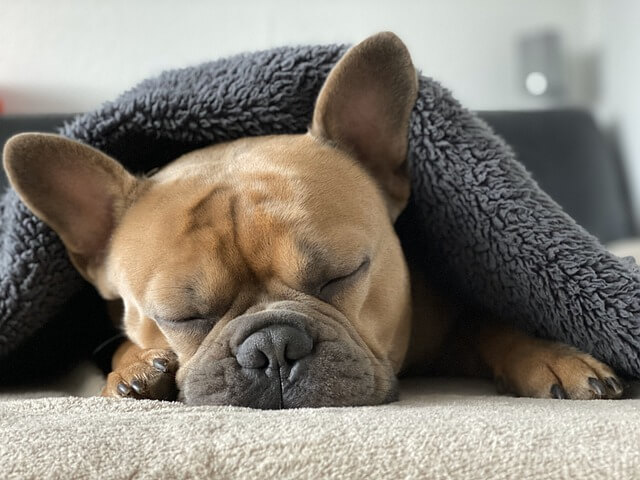
After they’ve been outside, check for your dog’s paws and dry them. Snow, salt, and grit on the road can compact between their toes. These can turn into small icy balls which can hurt them. Drying and cleaning your dog’s paws is important especially if he has lengthy fur.
You can also trim the hair from their paws to avoid such a painful experience. If an outdoor visit is indispensable, make sure your dog is wearing boots.
2. Adjust Their Calories
Winters bring out the couch potato from even the most active dog breeds. Due to their lazy behavior in cold weather, they need fewer calories than usual. You may think that extra calories would help them with warmth. It can lead to serious health issues, like obesity, in the long run.
Therefore, keep a record of their activity levels and adjust their food accordingly. Small amounts of honey and fish inclusions are great for dogs’ health in the winter season. These foods help them fight infections and improve their coat and skin.
3. Keep Them Hydrated and Moisturized
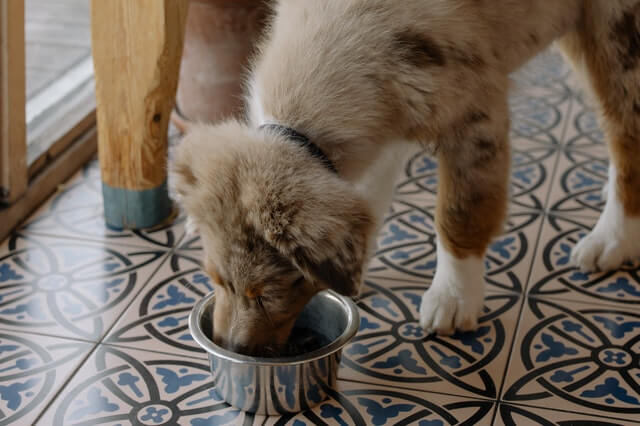
Like many of us, dogs also tend to drink less water in winters than their usual quota of water. It can lead to dehydration. Therefore, provide your dog with an ample supply of freshwater. Adjust their diet with wet dog food, soups, and broths.
Moreover, the lack of water and cold dry winds make your dog’s skin dry and flaky. You can prevent this by applying pet moisturizers or coconut oil to his skin. Coconut oil is also beneficial in preventing cracked paws, ears, or tails too.
4. Prevent Health Risks
Some common medical conditions in pets such as common cold and arthritis, get worse in cold temperatures. As a part of the dog winter care, You should take your pet to the vet for examination during this round of the year. Frostbite and hypothermia are other conditions that need to be kept in check.
Watch for the signs of pale and grey skin, depression, lethargy, and weakness. Severe frostbite makes dogs’ skin black and rough. Hypothermia, in worst cases, causes muscle stiffness and slows down heartbeat which can result in death. Therefore, keep your dog indoors and warm enough to prevent such circumstances.
5. Keep Them Warm!
Larger adult breeds of dogs with lengthy fur can tolerate mild winters a little easier. While smaller breeds, puppies, senior dogs, and breeds with shorter coats are more susceptible to harsh winter chills. An easy way to keep your dog warm in low temperatures is with a pet blanket, dog coat, and a cozy bed. Wrap up your dog especially during outdoor visits.
Make sure to have a comfortable and warm pet mat that can be spread out anywhere, even in cars. The coat should cover the dog from the neck to the tail. Warm blankets and raised beds are great in keeping the dogs off the cold floor and creating a snug environment.
6. When to Visit Outside?
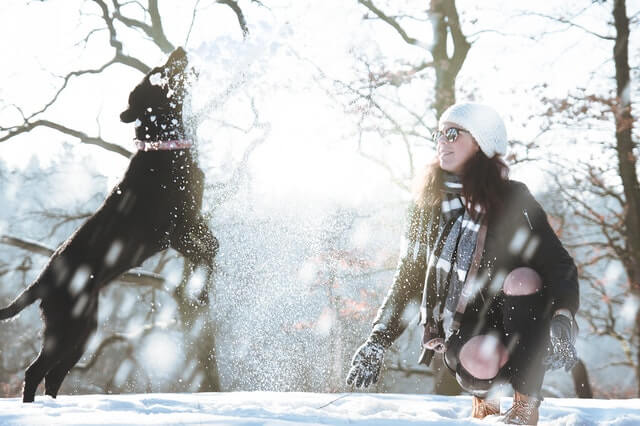
Your dog might love spending time outdoors. Keep in mind even the furriest dogs are susceptible to frostbite and hypothermia. Therefore, limit your dog’s outdoor time in winters. Do not let him stay outside for long. Also, avoid letting him out in the early morning or late afternoon hours.
Spend time with him outdoors during the daytime when it’s sunny. Sunlight, in addition to providing warmth, provides both you and your pet with vitamin D. Therefore, it would be the best time for your dog to play and keep up with his activity levels.
7. Grooming
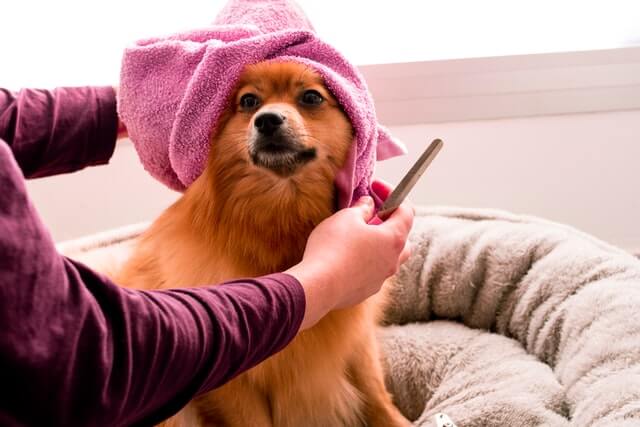
In the winter months, as your dog spends much more time indoors, you might think it’s time to get relaxed with the grooming routine. The opposite is always the best. Dogs are blessed with coats that act as a natural warmer for them. So, as you avoid trimming this fur in winters, dogs need extra grooming and care. Brush your dog’s coat regularly and carefully.
Keep his nails trimmed and ears cleaned. Use coconut oil to prevent skin or paws from drying out. Reduce the number of baths. During batting, use slightly warm water. Keep the pet in a closed environment while batting or grooming him. Always clean and rinse your dog’s paws after frosty walks.
8. Block Off Heat Sources
Pets usually chase heat sources to cuddle up or take a nap when the temperature drops. But they are certainly not aware of how hot these devices and places are. They may try to curl up next to a chimney or jump up on a heater.
So to avoid such gruesome experiences, keep these heating devices or places inaccessible to your pets. If putting a heater or radiator on is indispensable, do not let your pet lay close to it. After the room is heated enough, turn off such devices for the safety of your pet.
9. Always Use a Leash Outside
No matter how harsh or mild, winters bring fog and snowy weather conditions that reduce our visibility. First of all, never let your dog out without a leash. There are high chances of accidents especially if you are walking by the road.
If your dog is not comfortable with the leash, train your dog to have a good recall. You can also attach a microchip to your pet to avoid getting him lost. Also, try to stay away from the frozen water surfaces and snowy roofs. You may never know how secure the surface is.
10. Care with The Dogs’ Car Travel
When you venture out with your furry fellow in a car, keep some things in mind to avoid bad experiences. First and foremost, never leave your pet unattended in the car. Just as cars can be too hot in summers, temperature drops in the winters can be unbearable too. Rather than leaving your pet in the car alone, take him with you for any period.
Also, antifreeze tastes sweet to dogs. They will lick it instantly without knowing that it is extremely toxic. Even a small amount of antifreeze can be fatal for pets. Hence, do not let your dog anywhere where he may encounter such toxins.

